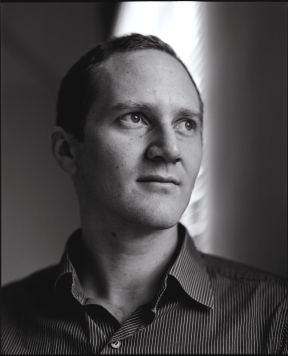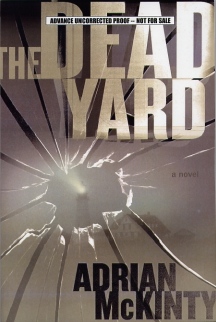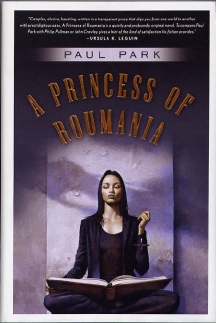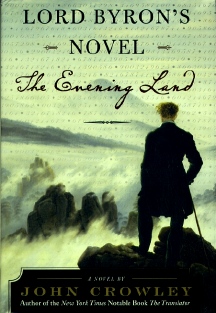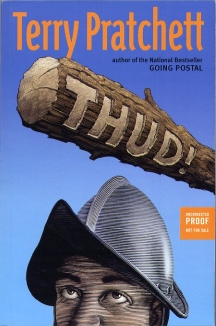|
|
|
This Just In...News from the Agony Column
|
09-09-05: Visionary Terror |
|||
A
Conversation with Chris Cleave
As I actually rather suspected, Cleave was as nice in person as he had been via the ether. We met in the lobby and retired to the "Club Lounge" of the hotel. It was quite easy to set up the little hand-held digital recorder I brought and we proceeded to talk for an hour. Claire kept us company, mostly to fend off anyone who might attempt to use the lounge. Fortunately, there was no competition. The time just flew by, it was really rather surprising. Cleave is a totally professional interview-giver. I was using a single mic to do the interview, which involves this whole back-and-forth deal that I had learned a bit but not done a great deal. Cleave would nod curtly to let me know that he'd finished a response and was ready for another question. It sounds like a little thing, but it really made the interview quite a bit easier. Yes, I know, I'm verging on too much information. I'd rather err on the side of completeness. But mostly what characterized the interview was how genuinely fond Cleave was of his creation, of London, and of humanity in general. He certainly gave no indication of being the cad the journalist from 'Incendiary' was. Of course, he explained early on that his work as a journalist involved exporting stories to a website -- not exactly what his journalist character did, but certainly enough to put him in an environment with such characters. After we finished the interview, which I've split into two parts (part 1/mp3, part1/RealAudio ; part 2/mp3, part2/RealAudio), Cleave had another interview to do via phone, which he did using the phone in the Club Lounge. It was pretty interesting -- and frankly heartening -- to hear at least one half of another interview with Cleave, so I could compare notes, sort of, as to what we talked about versus what he talked about with his other source, which I believe was a radio station. In general, they asked him pretty much what youd expect, which was his response to the terrorist attacks that had occurred with the publication of his novel. I got the impression that they'd actually read the book, at least. I think. And that was that. I bade Cleave farewell, and sent him out into the wilds of London, then went forth with my Claire, for a look at the museums, and of course, Forbidden Planet Books. You know, I didn't notice 'Incendiary' on their shelves, and to my mind it should be. Call it instant alternate history, dystopia derailed by reality. |
|
09-08-05: Adrian McKinty's 'The Dead Yard' |
|||
Tough
Talk and Flat-Out Lies
'Dead I Well May Be' introduced readers to Michael Forsythe, an Irishman who exports himself to escape from the Troubles in Ireland only to land in Trouble-with-a-capital-T in New York. Working for a gangster, he manages to end up in a Mexican prison from which he escapes to exact a bit of revenge served up red-hot by McKinty's flashy prose. Told in the first person, we should have known that 'Dead I Well May Be' wouldn't the last we were going to hear from Forsythe, and it's not. With 'The Dead Yard', Forsythe finds himself on vacation in Spain. Of course this can't last. Forsythe ends up in the midst of a soccer riot and is escorted directly to a Spanish prison. There, he's offered a deal by Samantha, a British Intelligence Agent. Do I have to say she's a babe? No, I don't. Michael gets one of those choices-that-is-no-choice. Go To Jail, Go Directly To Jail In Mexico -- and readers of McKinty's first novel will remember that unpleasantness he experienced in those accommodations -- or go directly to New York to infiltrate an IRA sleeper cell. Oh, the war may be over but the soldiers are still fighting, eh? What else is there to do when you're a bloodthirsty thug with an agenda topped by VIOLENT REVENGE? Well, dont forget the torture. And dont forget the prose. Pick up McKinty's first novel in the bookstore and you'll quickly twig as to whether or not he's your cuppa. And if your favorite writers include the likes of SF writer Richard Morgan, horror writer Richard Laymon, or mystery writer George Pelecanos, then get ready to add another notch to your want list. McKinty has a style of his own that will appeal to readers of these writers and more, so long as you like your hard-boiled on the mean side of lyrical -- or the lyrical side of vicious. You're in for more and finer as McKinty hones his style to the sort of knife-blade-that-cuts-the-thumb sharpness that one finds in the best first-person crime fiction. McKinty gets that surreal, slightly shiny edge on everything he describes. He recreates for the reader the feel of having been up for about thirty-five hours in a row, and on your twentieth cup of coffee. Everything is slightly unreal. All the edges are sharp, and any piece of this damn world might slice you to ribbons. The same might be said of McKinty's writing. On reflection, I might suggest you not try reading McKinty's in the bookstore, unless you're lucky enough to have the sort of bookstore that has big comfy chairs. Or unless you like to read standing up, which might in fact be a great way to get into this uncomfortable writer. Standing there with your back throbbing unable to stop reading is probably going to give you fair idea of what McKinty is on about. He's on about a fist in your face and a thumb in your eye. McKinty does not live in a pretty world, and this is not a pretty book. But then, as I sit here thumbing through 'The Dead Yard,' waiting for M for Mystery to open so I can order 'Dead I Well May Be' and 'Hidden River', I realize that this is a pretty book. So long as your idea of pretty includes eyes, thumbs and inventive combinations of the two. |
|
09-07-05: Paul Park 'A Princess of Roumania' |
|||
"Bad
Enough to Please"
And here's where we insert our regular hymn to PS Publishing. Last year, PS published 'No Traveller Returns', a surreal novella that starts when a man encounters something remotely resembling a cryptid ape-critter in the mountains of Northern India. From there things get really strange, the kind of literary strange that makes me buy books. But unless you have a local Logos, buying books from Park is something of a challenge. Park is one of those guys who sort of stumbled into writing science fiction. He started his first novel 'Soldiers of Paradise', while living in New York, but finished it in New Delhi. His work is more likely to be informed by Charles Dickens than Philip K. Dick. But like many super-talented writers, he wrote outside the boundaries of genre, and happened to submit his work first to SF magazines as opposed to literary journals. And thus is a career in publishing SF born. 'Soldiers of Paradise' was the first entry in 'The Starbridge Chronicles', a classic bit of late-eighties-un-categorizable-except-as-SF that earned him a great reputation and publication with Tor. He followed this up with 'Sugar Rain' and 'The Cult of Loving Kindness', all novels that could have found a lot of resonance with the literary crowd had they not been published with the kind of covers that sends the literary crowd scurrying for cover. For those who dont have Logos in your downtown garden mall, here's the scoop on 'Coelestis' and 'Celestis'. Theyre the same book, the first published by HarperCollins UK in 1993, the latter published by Tor in 1995. The 'Atlas Coelestis' published by Johann Gabriel Doppelmayr in 1742, is a collection of astronomical plates, and Doppelmayr's most famous work. One is inclined to think the name change from HarperCollins to Tor came about because the first sounds obviously Latin, while the latter sounds obviously science-fictional. Be assured theyre the same book, but if youre looking for a first edition, go with the Latinate spelling. Its probably a good idea to hunt down first editions of Park's work. His latest novel is 'A Princess of Roumania' (Tor Books / Tom Doherty Associates ; August 2, 2005 ; $24.95), and he described it way back when (in October of 2000) in an interview with Nick Gevers over at Infinity Plus as, in the words of John Dryden, "Bad enough to be good." When a writer like Park speaks in those terms, you'd best pay attention. 'A Princess of Roumania' is the kind of novel that, with a little luck, eventually hits it out of the ballpark. Miranda Popescu is an adolescent girl who dreams she is a princess. That's certainly not unusual. She was adopted as an infant from an agency in Bucharest, brought to American and raised in Massachusetts. But Miranda is a princess, in an alternate world where Roumania is a world power and things run on magic. 'A Princess of Roumania' starts when she first twigs to the fact that she's more than the average dreamer. But what Park has done with 'A Princess of Roumania' is to take his literary, slightly surreal SFnal spin and apply it to a novel surely suitable for intelligent young adults. He's tapping in to the enormous, enormous audience hungry for YA fiction, but he's headed that direction with a literary, adult spin. Credit Tor with some nice jacket art by John Jude Palencar, and for publishing this in hardcover. And make sure you buy it now, in this sturdy first edition, because somewhere about the third book or so, this is going to blowout into the mainstream consciousness. Park has the chops of writers like John Crowley and Jonathan Lethem, and this novel has an even wider potential appeal than Harry Potter. No need to conceal his sex by calling him P. C. Park; he's already got the teenage guys hooked with that concise manly-man name. Of course, perhaps Tor could re-package the book as being by a P. C. Park for the teenage-girl market. Let's hope it does not come to that. Because, like the books that need no name, the real appeal of Park's writing is universal. He writes a ripping yarn with a surreal edge for the vast audience that enjoys a) great prose, b) a modicum of imagination c) no condescension. He offers a true puzzle here, one that will continue in next year's 'The Tourmaline'. And it even looks as if Tor is not going to ask him to rename it to 'The Tormaline'. Buy the book, hold your breath, and be willing to look for 'The Tormaline' by P. C. Parks, just in case. |
|
09-06-05: John Crowley's 'Lord Byron's Novel The Evening Land' |
|||
Possessive
and Obsessive Literature
And that's not surprising, because Crowley's novels encompass the world as one, they brilliantly externalize our emotions and our internal lives into what seem to be bright glowing threads of prose. If you've ever watched a sunset and felt that you were somehow connected to everything on earth, that you could sense the secret conspiracies that move between people and between worlds, then you have a good idea of what reading a John Crowley novel is like. He gets under the skin of the world, sort of shakes it up and lets the reader peek in and feel a part of it all, especially the secrets, the sins, the joys that are the levers which move everything and anything. For me, John Crowley is connected to fall in Los Angeles, where I bought a trade paperback copy of 'Aegypt' at 'Change of Hobbit' when it was on Santa Monica Boulevard, near the freeway, in the same location where I first met Clive Barker, where I decided to buy a very expensive-to-me book by a little known author named Stephen King and titled 'The Dark Tower: The Gunslinger', where I found the Stanislaw Lem, Philip K. Dick and other books that started the journey that has led me to this point. Crowley is very much a writer like another writer who recently showed up here, Mark Helprin, and anyone who enjoyed 'Winter's Tale' or 'Freddy and Fredericka' should run, not walk and buy Crowley's latest work 'Lord Byron's Novel: The Evening Land' (Wm Morrow / HarperCollins; June 1, 2005 ; $25.95). Of course, everyone else should as well. Crowley has woven together many strands to once again create something incredible, something previously unimaginable. And something quite surely metafictional. 'Lord Bryon's Novel' is yet another take on the world's most famous literary party, that is, the gathering one night at Lord Byron's villa of Byron, Mary Shelley, Percy Bysshe Shelley, Claire Clairmont and John Polidori that resulted in Mary Shelley's 'Frankenstein'. In fact, 'Frankenstein' came about because Mary Shelley challenged the others to write a ghost story. Byron soon gave up on his, and Crowley's novel applies the traditional science fiction question -- "What if?" -- to a literary circumstance. "What if," the novel asks, "Byron finished his novel?" And what if his sister, Ada, an early cyberneticist who worked with Charles Babbage, translated the novel into a code to conceal it? This party has been the focus of lots of speculation by the literary giants of science fiction; probably my favorite thus far is Tim Powers' 'The Stress of Her Regard', which brings a sort of lamia/vampire/demi-god into the mix and spins out astonishing landscapes. This is John Crowley, so you must know that you're going to get Lord Bryon's lost novel, and it's going to be as thrilling, as gorgeous as you might hope it would be. And youre going to get a contemporary literary thriller, as Alexandra Novak, the daughter of a Byron scholar, translates Ada's notes. Bryon's epistolary style is updated in the emails that Alex exchanges with her father and others. Crowley offers readers a unique work of science fiction in 'Lord Byron's Novel', a work that speculates and changes the gears of literary technology, and monkeys with them within itself as well as considering what-ifs of our inherited literary history. The literary import of this party is inestimable. For how many parties give birth to genres as well as great works of fiction, and then, centuries down the line, inspire further masterpieces? Where are those events now? Are they happening at bookstores, in private houses, on the beach under spectacular sunsets? Are you there, right now? |
|
09-05-05: Terry Pratchett Goes 'Thud!' |
|||
Discworld Declares a Truce on Reality
Of course, and alas, you can buy 'Thud' on eBay, I just checked. Apparently there's a guy there who specializes in selling proofs. Please wait and buy the hardcover. Go to one of Pratchett's many upcoming stops on his tour to support 'Thud!' and have him sign it, or buy one of the many signed-by-Pratchett copies that you'll be able to find after the book comes out. Look, you'll be able to buy it in a week, so its not like your head's going to explode or anything. And buy it, as usual, you should. 'Thud!' finds Pratchett in top form. Though frankly, I've not seen him in any other. He's written enough of these Discworld novels that he's gotten rather good at it. Those expecting 'Thud!' to be another novel just full of laughs will find those laughs, but they'll also find that 'Thud!' is not just a funny novel. I asked Pratchett "Why Thud!? Why now?" and he told me that, "Why not? Sooner or later, everything happens. I wrote it more than six months ago, but it seems remarkably timely..." That's because 'Thud!', yet another one Pratchett's stories of Sam Vimes, a detective in Discworld involves the potential end -- or re-ignition -- of a long war, a blood feud between two factions. At Worldcon, Pratchett told me that this war is not going to come to an end in the traditional mode of fantasy novels. There will be no single, decisive, victorious battle followed by the crowning of a King and a kick-ass party. Instead, he described, "both parties backing away very cautiously" and agreements to form committees that would schedule further meetings to discuss further agreements, a slow and tedious process of negotiations that we see in this world. It's of course, a process ripe for satire, a fat sack of, well something that is waiting to be skewered by Pratchett's razor wit. And because Pratchett's Discworld, though it may be filled with werewolves, trolls and dwarves and all the traditional stereotypes of fantasy fiction, operates on principles quite like those of our world, readers will be in for something of shock when they read 'Thud!' Some will think that Pratchett took a quick jaunt in his Acme Time Machine ® a few months forward while writing the novel. But of course, that Acme Time Machine is no more real than Discworld itself, and any similarity between Discworld and our world is down to the Pratchett's ability translate reality with such a sure hand that Discworld seems utterly real. As for that Acme Time Machine? Well, if Pratchett ever starts offering stock tips, I'd be inclined to listen. |
